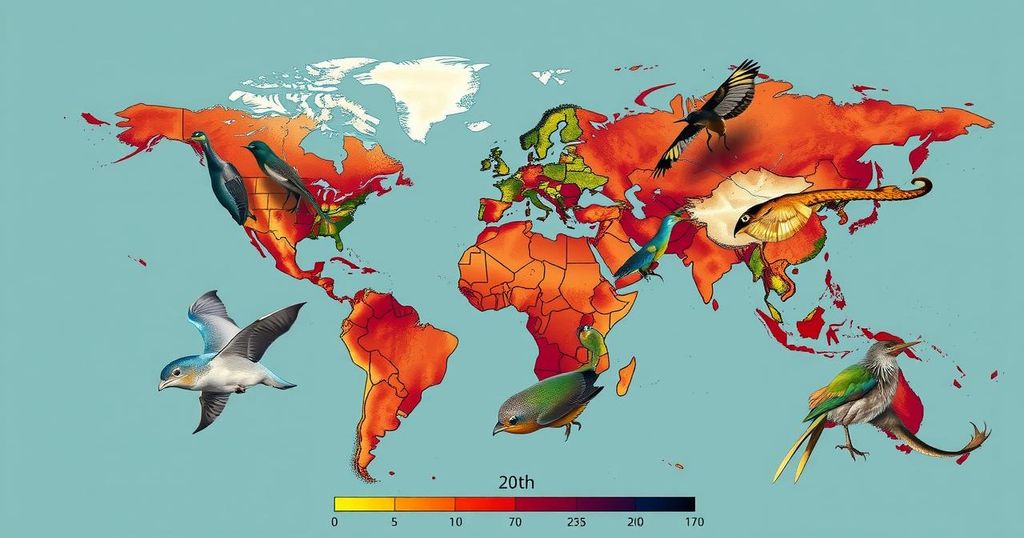Climate Change: A Dire Threat to Global Biodiversity and Extinction Rates
Climate change threatens global biodiversity, with up to a third of species at risk of extinction if temperatures rise significantly. A study indicates that even a slight increase above current levels could lead to higher extinction rates, particularly affecting vulnerable ecosystems. Current emission policies can offset some risks, but immediate action is needed to protect biodiversity and adhere to the Paris Agreement’s climate goals.
Climate change poses a significant threat to global biodiversity, with projections estimating that 7.6% of species could face extinction under current warming trends. A recent study published in the journal Science, led by biologist Mark C. Urban from the University of Connecticut, assesses the impact of rising temperatures on various species, emphasizing the urgency of the situation. Since the 1960s, historical data links 19 species extinctions directly to climate change, highlighting an alarming increase in the contribution of climate change to extinction rates by 4% per decade.
The analysis indicates that if global temperatures surpass 1.5°C, extinction rates could rise drastically, endangering approximately one-third of all species globally. Particularly vulnerable groups include amphibians and those endemic to mountain, island, and freshwater ecosystems, as well as species found in South America, Australia, and New Zealand. At the current global temperature of 1.3°C above pre-industrial levels, projections estimate that 1.6% of species are at risk of extinction; this figure is expected to rise to 1.8% at 1.5°C and 2.7% at 2.0°C. In a dire scenario with temperatures reaching 5.4°C, the extinction risk escalates to an alarming 29.7%.
The study argues that current emissions policies could reduce extinction risks significantly from 30% to 5%. Nevertheless, even a mere loss of 5% of species would have detrimental effects on biodiversity, ecosystems, and human populations that depend on these natural resources. The research advocates for a strict adherence to the 1.5°C threshold established in the Paris Agreement to limit extinction threats below 2%. Furthermore, it underscores the necessity of identifying critical species for protection to maintain biodiversity until comprehensive action against climate change is implemented.
The context behind this study is rooted in the critical examination of how climate change affects global biodiversity. As temperatures rise, ecosystems deteriorate, leading to increased extinction rates among various species. This trend has been reinforced by observational data correlating historic extinctions with climate-related factors. By analyzing the implications of different temperature thresholds, researchers aim to provide a clearer understanding of how species are vulnerable to climate fluctuations and highlight the urgency of immediate action in biodiversity conservation efforts.
In conclusion, the findings of the study underscore the profound impact of climate change on global biodiversity, with substantial risks of extinction looming as temperatures rise. The research emphasizes the importance of maintaining global temperatures within the Paris Agreement’s 1.5°C limit to safeguard countless species from extinction. Effective conservation strategies are imperative, including prioritizing the protection of critically endangered species to preserve ecological integrity. Without immediate action to mitigate climate impacts, the consequences for global biodiversity and ecosystems could be catastrophic.
Original Source: www.energylivenews.com




Post Comment